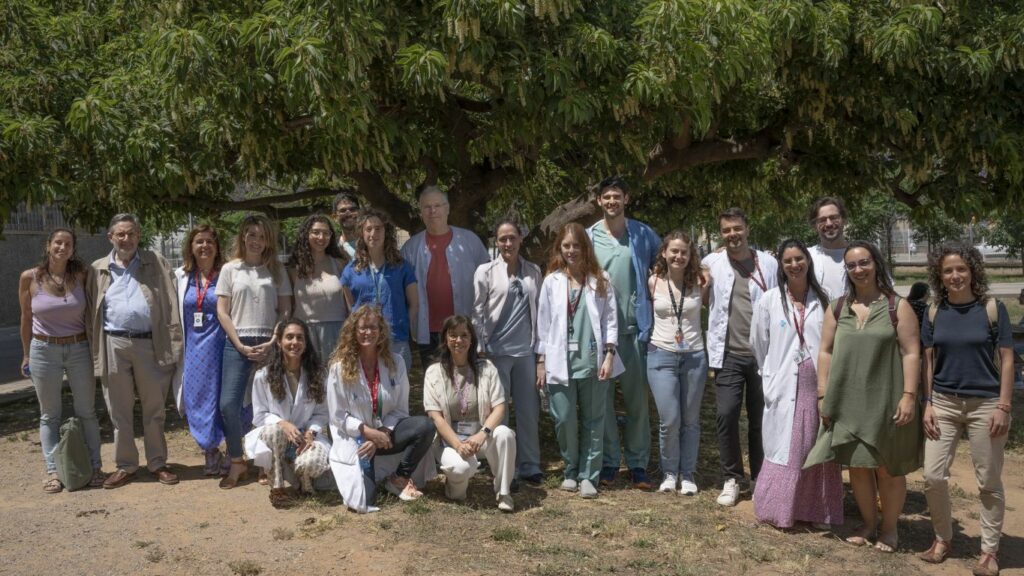The trial concludes that, although there are no significant differences in the number of patients who improved from lung damage caused by severe Covid-19-induced acute respiratory distress syndrome, the degree of improvement was greater in the group that received pirfenidone in addition to the low doses of oral corticosteroids they were already receiving.
This is the first randomized clinical trial to evaluate the efficacy and safety of pirfenidone, an antifibrotic prescribed for idiopathic pulmonary fibrosis and progressive pulmonary fibrosis, but this time in the prevention and reduction of earlier induced pulmonary fibrotic damage. The work has been published by the prestigious European Respiratory Journal in May of this year.
A total of 103 patients from 16 hospitals throughout Spain have participated in this multicenter, blinded and controlled phase 2 clinical trial, which has been led by the Interstitial Lung Disease Unit of the Pneumology Service of the Bellvitge Hospital coordinated by Dr. María Molina.
The first clinical trial to evaluate the impact of pirfenidone on COVID-19
95% of patients showed improvement in both treatment groups (one with low-dose oral prednisone and placebo; the other with low-dose oral prednisone and pirfenidone). Until now, there had been preliminary studies and case reports that pointed to a possible beneficial impact of pirfenidone on COVID-19 infection, but FIBRO-COVID is the first clinical trial that has directly evaluated the impact of the antifibrotic.
“The objective was to check which group of patients improved the most: those who received corticosteroids for 24 weeks or those who took pirfenidone plus corticosteroids, always with the aim of trying to avoid or prevent the establishment of irreversible fibrosis in the lung, because if it is established and progresses, we can only delay the progression, but not stop it or prevent death. We must start working to prevent the establishment of mature and progressive pulmonary fibrosis,” explains Dr. Molina, who is also scientific director of IDIBELL and the Respiratory Diseases Area of the CIBER.
The importance of preventing fibrotic damage to the lung
The severity of acute respiratory infection with coronavirus in people who have suffered a severe infectious disease caused by COVID-19 entails a life-threatening condition or the development of persistent fibrotic lesions in the lungs. Once scarring in the lung progresses, fibrosis, a chronic disease with no cure, becomes almost inevitable. For this reason, it is essential to prevent pulmonary fibrosis with the earliest possible approach.
This was the purpose of the FIBRO-COVID clinical trial, which began to incorporate patients infected with the initial variants of SARS-CoV-2 in June 2020. Follow-up of patients ended in January 2022.
The results of the clinical trial will have to be ratified by new studies, according to Dr. María Molina, who also highlights its potential application in interstitial disease induced by any respiratory infection or severe pneumonia that leads to acute respiratory distress syndrome (ARDS) that does not fully recover after the acute phase.
A paradigm shift in the world of clinical trials
The relevance of the FIBRO-COVID clinical trial has been underlined by its mention in an editorial article signed by the prestigious researcher Harold R. Collard, vice-chancellor of the University of California, San Francisco (USA), in the same issue of the European Respiratory Journal where the trial is published.
The article mentions the FIBRO-COVID trial as an example of the paradigm shift that clinical trials need to be able to contribute sooner to the improvement of the health of the population. Collard highlights how during the early COVID-19 pandemic, a group of Spanish centers organized and began to enrol participants in the trial and thirteen months later the registration period closed, so that by the end of 2021 the study was complete.
The Bellvitge Biomedical Research Institute (IDIBELL) is a research centre created in 2004 and specialising in cancer, neuroscience, translational medicine and regenerative medicine. It has a team of more than 1,500 professionals who, from 73 research groups, publish more than 1,400 scientific articles a year. L’IDIBELL is participated by the Bellvitge University Hospital and the Viladecans Hospital of the Catalan Health Institute, the Catalan Institute of Oncology, the University of Barcelona and the City Council of L’Hospitalet de Llobregat.
IDIBELL is a member of the Campus d’Excelencia Internacional of the University of Barcelona HUBc and is part of the CERCA institution of the Generalitat de Catalunya. In 2009 it became one of the first five Spanish research centres accredited as a health research institute by the Carlos III Health Institute. In addition, it is part of the HR Excellence in Research program of the European Union and is a member of EATRIS and REGIC. Since 2018, IDIBELL has been an Accredited Centre of the AECC Scientific Foundation (FCAECC).

